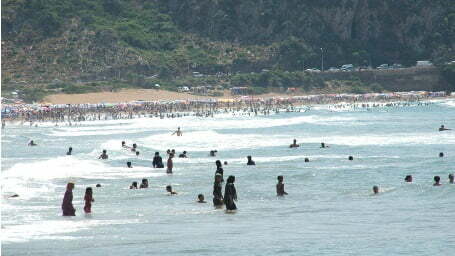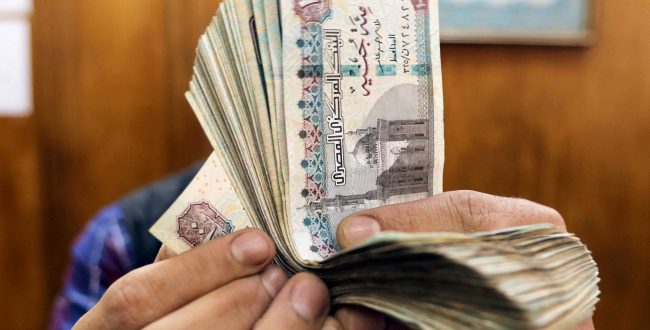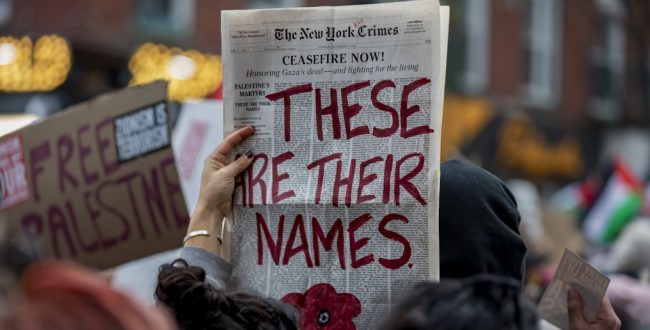Last month, an online campaign launched in Morocco with the hashtag #be_a_man ”( كن_رجلا # ). The message, shared mostly on Islamist Facebook pages, was that men should not allow their wives and daughters to wear tight-fitting clothes in public. This included dressing modestly at the beach, the claim being that revealing attire encourages sexual harassment and rape – forms of abuse whose prevalence in Morocco has come to forefront in the last two years, mainly thanks to social media.
A counter-campaign for women was quickly launched under the hashtag #be_a_free_woman ( كوني_امرأة_حرة #). The message here was concern over potential damage to the relatively advanced status of women in Morocco, and emphasis on women’s right to choose their clothing being a basic individual right.
This is not the first time that the way women dress has caused online furor in Morocco and other North African and Arab countries, throwing differences in values and religious views into sharp relief. In the hot summer months, arguments tend to focus on swimwear. For example, three years ago local authorities in the Moroccan city of Agadir arrested three young men for holding up a sign at the beach that read “ Respect Ramadan, no bikinis ”. Their target was primarily Western tourists. In contrast, it was religious women from the city of Tangier who demanded separate beaches two years ago in a bid to avoid harassment and uphold respect for the religious value of modesty.
A year before that, a women’s group launched an online campaign protesting a ban by Moroccan hotels on women bathing fully-dressed in pools. Morocco is not alone: this year, several hotels in Tunisia (one of the most secular Arab countries) banned women from entering pools in a burkini – a full-body swimsuit and head cover that is a portmanteau of “burqa” and “bikini” . The burkini, which has sparked controversy in recent years, and especially in Europe , is an expensive fashion item commonly associated in North African countries with tourists from the wealthier and more conservative Gulf States.
With an economy that relies heavily on Western tourism, Tunisia is also trying to cater to the Gulf States in the hopes of reviving its tourism sector, damaged in recent years by a spate of terror attacks at major sites. Religious circles in the country are backing “ Islamic tourism ”, tailored to fit a more devout crowd. Ten “halal” hotels have recently sprouted up in Tunisia offering prayer rooms, no alcohol, and separate spa services for men and women, with burkinis certainly welcome. To allay secular fears over growing religious extremism, it has been claimed that these hotels are open to the general public, including women who prefer bikinis.
Women’s swimwear has also garnered attention in Algeria . Last year, French media reported a ” bikini revolt ” in the North African country after thousands supported an online campaign calling for women to demonstrate in bikinis, or any other outfit of their choice, against Islamist demands cover themselves at the beach. However, it seems that no such mass protest took place. According to Algerian journalists who exposed the affair, French coverage was hyped up in order to tie the issue to attitudes regarding the burkini in France , where several local authorities had controversially banned it a year earlier.
One of these journalists described “coexistence between women wearing bikinis, bathing suits and burkinis”. This refers to the fact that for most of the summer – minus period of media uproar – North African beaches and hotels are a place where women (and men) with differing worldviews meet, rather than clash.
Israel is in a similar situation, with public debate growing about religious extremism and its impact on the status of women while beaches and resorts remain oases of shared recreation. Kosher hotels for religious Jews, as well as separate beaches for the ultra-Orthodox, have existed for years without secular complaint. Moreover, especially in Israel’s mixed cities, Muslim women can be seen at the beach in full body and head covers without incurring the kind of criticism voiced in Europe.
From a feminist perspective, the tension between burkini and bikini raises complicated questions. Choosing traditional religious attire or more revealing Western clothes is not only a personal matter but also a reflection of collective identity and shared values. Western critics see head covers, and especially burqas and burkinis, as symbols of oppression . Many Muslim women, however, see them as a form of protection and an expression of free will. Bikinis, too, represent both sexual freedom and an objectification of women that feeds into problematic ideals of beauty and thinness. These are dilemmas shared by feminists throughout the world – in Israel, in the West and in the Arab world.
Translated by Michelle Bubis


















